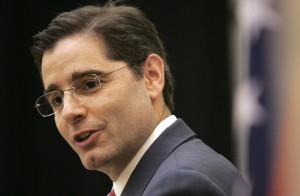The Federal Communications Commission is set to vote to relax a longstanding ban that prevents one company from owning radio and television stations and newspapers in the same city — a move that activists are calling a giant Christmas present to Rupert Murdoch. The media titan has floated the idea of buying The Chicago Tribune and The Los Angeles Times, the dominant papers in cities where he already owns TV stations. What’s worse, the FCC is operating behind closed doors, rather than inviting public comment on the issue.

Craig Aaron, Free Press
So Craig Aaron, president and CEO of Free Press, is asking people to speak out — by signing a petition, writing an editorial and calling congressmen. Aaron and his organization have been among those leading the charge against increased media monopolization. Similar attempts to change ownership rules were thwarted in 2003 and 2007. Earlier today, Bill Moyers caught up with Aaron via Skype to learn more about the current proposal and what viewers can do to help stop it.
Bill Moyers: Craig Aaron, tell us what you know about this FCC ruling that’s under consideration?
Craig Aaron: Well, what I know is that, according to all trade reports, the Federal Communications Commission is considering moving very quickly to get rid of longstanding limits on how much media one company can own in a town. And if they go with the plan that they’re currently considering, it would open the door to one company owning the daily newspaper, two television stations, eight radio stations, possibly even your internet service provider — all in one community. These are the exact same rules that are preventing someone like Rupert Murdoch of Fox News from owning The Chicago Tribune or owning The Los Angeles Times. If these rules go away, suddenly deals like that become possible.
Moyers: Why the rush?
Aaron: I have no idea, to be honest, Bill. These are rules that they have tried to push through in the past, back in 2003, again in 2007, and it has failed at every turn. It simply has not gone through. It’s been thrown out by the courts, rejected by Congress, and all of the sudden at the tail end of Obama’s first term, we’re seeing it again.
Moyers: But the chairman of the FCC is President Obama’s own appointee, his own choice to head it. Why would the president be wanting to approve a greater concentration of media?
Aaron: Well, that’s the $64 million question. Barack Obama as a senator was one of the leading voices against the exact same rules that his FCC chairman is pushing forward now. He wrote op-eds, he co-sponsored legislation to throw out these exact same rules, legislation that passed in the Senate. And yet, his own FCC chairman, his appointee, is suddenly in a huge rush to get this deal done, and if these reports are to be believed, they’re going to try and do this by Christmas, before the end of the year.
Moyers: Some people will say to you, why should we be concerned? We already have essentially six companies holding the majority of the media in this country. What’s a little more consolidation?
Aaron: Well, I think the real concern is at the local level. We can look back at the last twenty or thirty years, which, as you suggest, have been one move toward more consolidation after another. And what we’ve been left with is a media that isn’t serving local communities as well. The media is too consolidated. We absolutely should be talking about moving things in the other direction. The idea that the FCC would move forward with another giveaway to the Rupert Murdochs of the world is really unfathomable at a moment when the airwaves are already so consolidated, so concentrated, and simply don’t represent the diversity, and the diversity of viewpoints, of the American people.
Moyers: There is an argument to be made, and it is made by the other side, that newspapers are in serious trouble already. They’re cutting back on their budgets, cutting down on their editorial reporting and their editorial teams, and to save them we need for them to be owned by somebody like Rupert Murdoch who owns the New York Post which loses reportedly fifty to sixty million dollars a year here in New York. So why not let these companies that are successful in other areas of their enterprise save these failing newspapers?
Women and people of color are vastly underrepresented when it comes to owning television stations, certainly when it comes to newspapers. We need to be looking at how we are going to create opportunities at the local level. That’s how you’re going to sustain quality journalism. Not by asking Rupert Murdoch or any of these other big moguls to swoop in.
Moyers: You well remember that last time the FCC approved greater consolidation, Free Press and others led a campaign to try and stop it. Some two or three million American citizens posted comments, wrote to their senators, wrote to their members of Congress. And 99 percent of the people who wrote were opposed to consolidation. Is that a strategy you’re going to invoke now?
Aaron: Absolutely. We’re seeing a really angry public outcry. Just in the past 72 hours, more than 100,000 people have added their names to a petition against these rules. It’s starting to get a lot more attention and certainly the public does need to be heard. For me, that’s one of the most appalling things about what the FCC is doing — even the Republicans, when they were trying to loosen these rules, had public hearings. The current chairman of the FCC, Julius Genachowski, hasn’t sat through a single public hearing where he was facing any public comment.
I don’t think the public’s opinion on this has changed at all — 99 percent are against it. I don’t think the Congress’s opinion has changed. We just saw ten or eleven senators send letters to the FCC saying don’t go forward. And I honestly believe the court’s opinion hasn’t changed. They rejected these same rules twice before, and if the FCC continues down this path they will reject them again. But we shouldn’t have to get to that point. We have an opportunity here to stop the runaway push toward media consolidation. How will this impact diversity of ownership? How will this impact local news? Let’s have a conversation about it — a public conversation — and stop trying to just push through favors for a small handful of moguls.
Moyers: What does it say to you that the chairman of the FCC is running a secret process that would, in effect, gut media ownership limits?
Aaron: Well, I think he’s forgotten who he’s supposed to actually work for. I think the chairman of the FCC thinks it’s his job to just negotiate between companies. And this is an opportunity to remind him that this is actually not his job. His job is to promote diversity. His job is to promote competition. His job is to promote consumer choice. That is not something he has always seen as part of his job, but this is really the time for him to learn that lesson. The Federal Communications Commission is a very captured agency. The big companies have a lot of power there. A lot of people who used to work in the building now work in industry; a lot of people who used to work in industry now work in that building. But at its core, what the FCC is supposed to do is represent the American public. And that’s something unfortunately this chairman is having to find out the hard way.
Moyers: What can our audience do?
Aaron: Well the best thing they can do is go to FreePress.net. Lots of information about what’s happening there, and lots of information on what you should tell your representatives in Congress. Make sure they’re calling the FCC, add your name to our petition so that the FCC knows where you stand, and that you stand with the 99 percent of Americans who are against this kind of runaway media consolidation.
Fight Media Monopoly
Get the latest information and resources on media monopolies, and learn ways to express your opinion and influence policymakers on the FCC's role.


